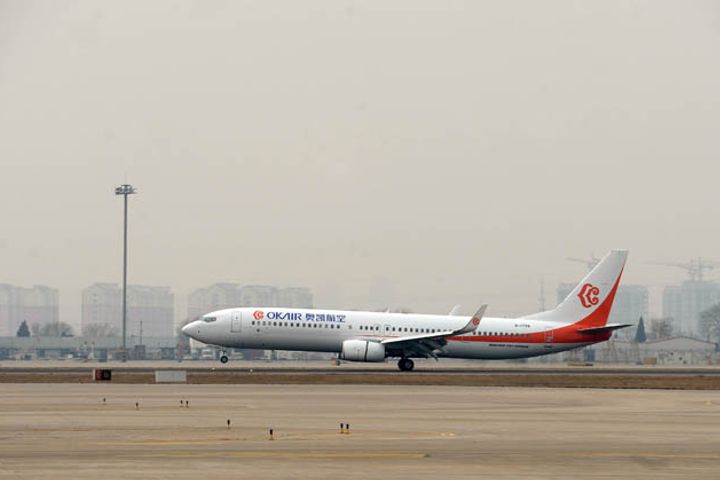 Private Chinese Airline Okay Airways May Get New Controller, Sources Say
Private Chinese Airline Okay Airways May Get New Controller, Sources Say(Yicai Global) Dec. 11 -- Chinese private airline Okay Airways may be handed over to a new controller again after its sale eight years ago. The two major potential buyers are local state-backed companies or investment consortiums, according to sources.
The Beijing-based carrier, which officially started commercial operations in 2005, was among the first batch of privately-held airlines set up in mainland China. Private logistics company Tianjin Datian W. Group obtained a controlling stake in the airline, which flies over 100 domestic and international flight routes, public information shows.
The group is reportedly now in talks to sell its stake. Zhengzhou Zhongyuan International Aviation Holdings Development and a consortium formed by Chengdu's state-owned investment platform and Chengdu Airport have both conducted due diligences with a view to taking over the airline, Yicai Global has learned.
The two prospective buyers are progressing with the required government approval procedures for specific investment ratios and investment amounts and debt burdens, sources wishing to remain unidentified revealed.
Wang Shusheng, chairman of DTW Group, invested a total of about CNY500 million (USD72.4 million) to acquire 94 percent of Okay Airways eight years ago. Wang also publicly said he planned to introduce other investors to list the company.
The carrier has, however, not managed to woo any strategic investors or list in capital markets after eight years. Huatian Investment, which Wang controls, holds 94 percent of the airline, while the remaining 6 percent is in the hands of a company mainly owned by the airline's founders and management.
China approved the establishment of several private airlines from 2004 to 2006 while the fate of most is unenviable -- aside from Spring Airlines and Juneyao Airlines, both of which are based in Shanghai and have gone public.
East Star Airlines and Jade Cargo International cancelled their registrations, while Eagle United Airlines long since became state-backed holding company Chengdu Airlines. Urumqi Airlines, a unit of HNA Group, will accept investment from the Urumqi city government in China's northwestern Xinjiang region where it is based and become a state-backed firm, it recently announced.
Another airline under HNA is expected to undergo a similar transformation soon.
The control of private airlines gradually being taken over by state capital is "mainly because the civil aviation sector holds high entry barriers in terms of resources and scales," Lin Zhijie, a civil aviation industry insider, told Yicai Global.
"Private small and mid-sized airlines find it difficult to profit with their insufficient resources, limited scales and high operating pressure. It's inevitable for them to be merged and reorganized by state-backed assets under the conditions of rising oil prices, exchange rate depreciation and weak market demand," he added.
The recent mergers and acquisitions are either driven by the fact that the airline itself is not making money or cash-strapped shareholders force its sale, Lin said, predicting that more airlines will come onto the block or be pushed to start M&As if the current economic cycle holds.
Editor: Ben Armour